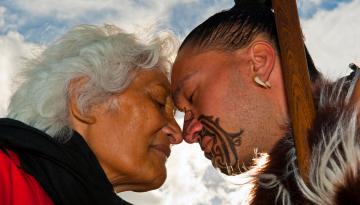Mark Richardson has declared his support for Kiwis learning te reo as Māori Language Week kicks off around the country - but revealed he personally chooses not to speak in New Zealand's native tongue.
The AM Show co-host earnestly expressed his support for the language on Monday, the beginning of Te Wiki o te Reo Māori, noting that his children are actively involved in learning te reo.
However, the sports reader acknowledged that when he is greeted with 'kia ora', he chooses to respond in English.
"You walk into the Koru Lounge in, let's say, LA - I do quite like it when the lady greets you with 'kia ora'," Richardson said.
When asked by host Duncan Garner what he says in return, Richardson confirmed he says "hello".
"The reason I say 'hello', and I'm totally and utterly in support - in fact I voted yes, it should be compulsory, my kids learn it, the lad does kapa haka - I totally feel they shouldn't have a choice, I think they should do it and learn it," he explained.
"I have absolutely no issue with anyone using it. I have no issue with [turning] on the news and you hear [Māori] words, I want more place names - I want the language to be saved because it's an important part of New Zealand.
"However, I choose personally not to speak it."
"And that's the way it should be, in my view," Garner agreed, acknowledging that although te reo is intrinsic to New Zealand's history and culture, whether or not someone learns it should be a personal choice.
"This is our taonga, this is our treasure, it's nowhere else in the world. The reason why we need it to survive is because when three million tourists a year [come] to New Zealand, guess where they go? Guess what they're fascinated by?"

Co-host and newsreader Amanda Gillies added that te reo Māori is an inherent part of New Zealand's identity.
"It's who we are - it's our heritage, it's our people, it's our history. I think we need to learn about who we are before we learn about anything else. Like you Mark, I love that it's in schools, the little kids take part in kapa haka... and they learn about our history."
Gillies noted that with a significant portion of New Zealanders travelling overseas prior to the global pandemic, it's imperative that Kiwis explore their own history and culture before discovering others.
According to Statistics NZ, an estimated 100,000 to 110,000 New Zealand residents were travelling to foreign countries as of mid-March this year.
"We go to other countries and we're fascinated by their languages and what their history is - but gosh, not here," she said.

It's not the first time Richardson has declared his support for learning the native language. In 2018, the former cricket player made a passionate push for making te reo compulsory in schools.
"The language is an endangered species," he said on The AM Show. "When you get an endangered species, certain things happen that are mandatory - I think it needs to happen with this language.
"Just because I'm white, middle-aged and a National voter, you think that I think a certain way - no. I'm a very fair individual."
As Aotearoa's native language, te reo Māori became one of the nation's three official languages - alongside English and sign language - in 1987 when the Māori Language Act was passed into legislation. The bill also led to the establishment of the Māori Language Commission -Te Taura Whiri i te Reo Māori - which promotes the revival of Māori and its normalisation as a form of communication. In April 2016, Parliament passed The Māori Language Act 2016, establishing the Te Mātāwai organisation to lead revitalisation efforts on behalf of iwi and Māori.
In 2018, the Government set a goal of achieving 1 million speakers of basic te reo by 2040.
Although learning the language is currently not compulsory, there have been pushes to make te reo Māori a mandatory subject in schools, with many advocates arguing that compulsory learning of te reo will lead to a deeper understanding, acceptance and normalisation of the culture and sense of unity. In 2018, Minister for Māori Development Nanaia Mahuta revealed the aim of making te reo a "core subject" in primary and intermediate schools by 2025.
Yet in an opinion piece earlier this year, Te Ao reporter Heta Gardiner opposed making te reo compulsory, arguing the language should be cherished.
"I reject the idea of gifting it to those who don't want it, and I don't want any part of forcing it upon those that hate it," he wrote.
"There will be protests to Parliament, petitions, all in the name of 'Don't force me or my kids to learn Māori!'. It will be an endless stream of revulsion towards te reo. I for one, am not hurrying to expose our taonga to such treatment."
The annual Te Wiki o te Reo Māori campaign, led by Te Taura Whiri i te Reo Māori - the Māori Language Commission - aims to get more New Zealanders learning and appreciating the indigenous language. The campaign begins on Monday.



